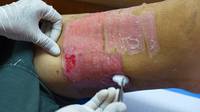
Attack, Alcoholism and Shock
Heart Attack
The technical term for heart attack is myocardial infarction. Myomeans "muscle", kardia means "heart," while an infarct is an area of tissue that has died because of oxygen starvation.
Heart attack is the unscientific term that is applied to the event that occurs when a blood clot blocks the flow in one or more of your coronary arteries. When the clot blocks the blood supply to a heart muscle region, the oxygen supply to the cells in that area is cut off. Just as in angina pectoris, this usually produces pain. The difference is that the interruption to the blood flow is temporary in angina, but in a heart attack the blood supply to a portion of the heart muscle is completely or almost completely shut off. The result is that the heart muscle in the affected region dies.
Most often the clot that causes the heart attack forms in a coronary artery narrowed by the thickening of its walls by the fatty deposits of atherosclerosis.
By definition, a heart attack is a medical emergency: if you think you are having a heart attack or are with someone who is, seek immediate medical attention. If your companion's heart attack has caused him or her to stop breathing, immediate cardiopulmonary resuscitation is necessary.
Do not delay seeking medical help. Deferment of medical help is a mistake that takes thousands of lives every year. You may think the pain will disappear for its own accord; at other times a heart attack can be confused with so-called heartburn. Get immediate help. It may save life.
Signs And Symptoms
- Intense, prolonged chest pain, often described as feeling a heavy pressure against the chest.
- Pain may extend beyond the chest to the left shoulder and arm, back, and even teeth and jaw.
- Prolonged pain in upper abdomen
- Shortness of breath
- Fainting episode
- Nausea, vomiting, fainting, and intense sweating may occur.
- Frequent angina attacks that are not the result of physical exertion.
Diagnosis
In the emergency vehicle or when you reach the hospital and professional medical care, your blood pressure will be taken and an electrocardiogram (ECG) will be recorded. In fact, you may be attached to this machine for much of your hospital stay so that your physicians and nurses can constantly monitor your heart's condition, perhaps within the confines of a special section of the hospital specifically for patients with heart conditions. This special section is called a coronary care unit.
Treatment
If you have symptoms that suggest a heart attack, call for emergency service or a doctor for immediate help.
In some cases, a drug will be administered to dissolve the clot that is blocking the flow of blood. There is a wide range of drugs your physician may prescribe depending on your condition and your rate of recovery.
1. Pain Killers. If your condition is stable, but your pain is great, you may be given an analgesic drug such as morphine to relieve the pain.
2. Nitrates.These drugs work for decreasing the oxygen requirement. The best known of them, nitroglycerin, is placed under your tounge at the onset of angina pain. Nitroglycerin often is given through a vein during or after a heart attack to produce a continuous decrease in oxygen requirements.
3. Beta-Adrenergic Blockers. These block the stimulating effect of the hormone epinephrine (adrenalin) on your heart. The result is that your heart will beat more slowly and less forcefully and this will require less oxygen to continue its work.
4. Calcium Channel Blockers. These drugs interrupt the normal flow of calcium through channels in your heart muscle. Although they are not used routinely in treating heart attacks, occasionally, physicians prescribe one of these medications to decrease the heart's demand of oxygen.
5. Aspirin. Because aspirin helps dissolve blood clots, it is frequently administered as soon as a heart attack is diagnosed. Aspirin often is used in combination with heparin, a drug that prevents clotting.
Alcoholism
Alcoholism is considered a chronic disease, often progressive and fatal, with genetic, psychosocial and environmental factors influencing its development. It is characterized by periods of preoccupation with alcohol, distortion in thinking, impaired control over alcohol intake, and repetitive use of alcohol despite adverse consequences. Each of these symptoms may be continuos or periodic. It is the physical dependence on alcohol and compulsive behavior related to alcohol use that usually distinguish alcoholics from other problem drinkers.
Drinking problems in people who do not have all the characteristics of alcoholism are often referred to as "alcohol abuse", "harmful use of alochol", or "drinking problem". Persons who abuse alcohol also engage in repeated excessive drinking that results in health or social problems or both. They may also continue to consume alcohol despite knowing that continued intake poses social problems for them. However, they neither are dependent on alcohol nor have lost control over the use of alcohol.
Excessive drinking of alcohol can produce several harmful effects on your brain and nervous system. If you are an alcoholic, genetic factors may also influence some neurologic complications. Excessive use of alcohol can also damage your liver, pancreas and cardiovascular system.
First Aid For Alcoholism
Alcohol intoxication, whether due to an acute overdose or to prolonged abuse, is treated as follows:
1. If the person is sleeping quitely, his face is of normal color, his breathing is normal, and his pulse is regular, no immediate first aid is necessary.
2. If the person shows such signs of shock as cold and clammy skin, rapid and thready pulse, and abnormal breathing, or if he does not respond at all, obtain medical aid immediately.
3. Maintain an open airway, give artificial respiration, if needed, and maintain body heat.


















